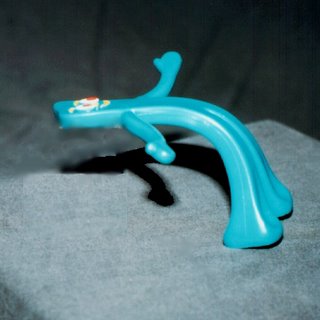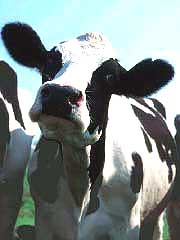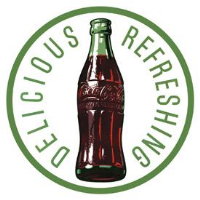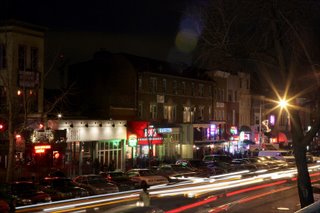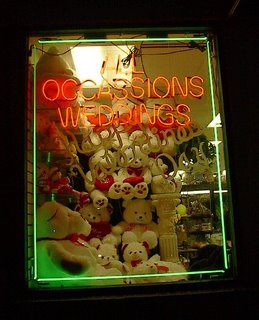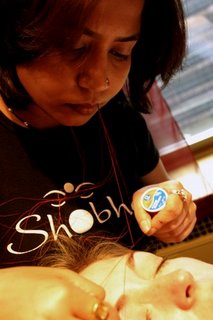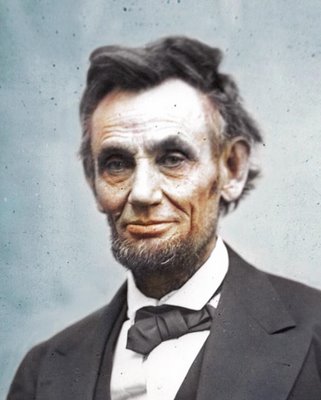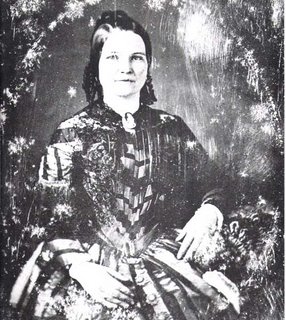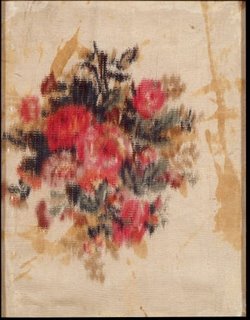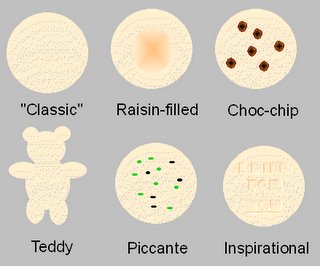 William Shakespeare 1564-1616
William Shakespeare 1564-1616
Yesterday was the anniversary of William Shakespeare's birth (2) and rather than write about his life, or his work, I went to a bookcase and pulled down four books that have been in my life since my teens. Some bear value and in some, the only value is held in the memory.
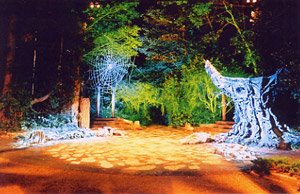
I've been trying to remember which of Shakespeare's plays I read first. I think it must have been
Romeo and Juliet, or
Julius Caesar. When I was fourteen, I purchased a copy of four of his comedies in a used bookstore for pennies, and I broke one rule that's been fairly consistent in my lifetime: I don't write in books. Not even my name. I decided this time, however, to use the glossary in the back of the book and write the meaning of the words next to the appropriate passages, so I would have a better understanding of what was being said in the text. The ultimate goal, I think, was to be more conversant in the antiquated language and eventually dispose of the book.
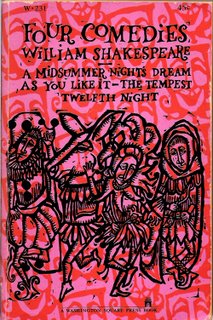
What happened was this. I was growing restless attending church and all of the other religious programs that my parents had me in. By the time I hit my teen years, my friends and I joined our peer group in the church where we all sat perched high over the congregation in the very last rows of the balcony. The last seats butted up against the stained glass window. There, we were free from adult supervision, and I would imagine none of us was paying attention to the service.
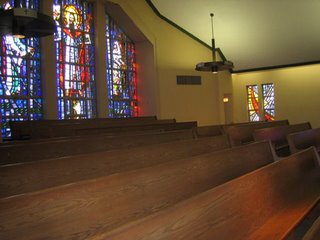
Even that got to be too much for me, so I found a way of sliding out, once the service had begun. I would go down a back stairway and work my way outside. The only trick was to have a watch on me and to make sure I was back in time before things were winding up. I took to walking over to a nearby school and sitting on a bench under a covered entranceway, even on the coldest days, reading this book and making my notations. I haven't looked at this book in a few years, and it's eerie to see my fourteen-year old handwriting and remember how much I wanted to be free from people having control over my life.
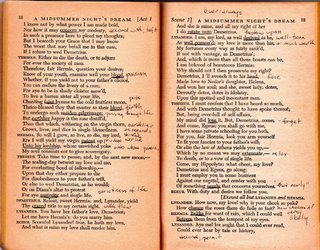
At some point this boy who was two years younger than me wised up to what I was doing, and one time he sat down next to me in church and asked if I would take him with me. I agreed, with the stipulation he keep his mouth shut and never let on that we were doing this. We never got caught. He was a handsome little boy and very popular in his age group. I had no previous contact with him, really, but then you know how it is at that age. A two year age gap might as well be twenty. He did, however, live two doors down from a friend of mine, so we had a casual acquaintanceship, and of such things are friendships born. Once he started going along on these escapes, the reading ended, and we would walk and talk about things on our mind. That stands out, too, and thinking about it in retrospect, it seems rather odd. We never had frivilous conversations. I have a definite memory of him really pouring his dreams out to me, which seems so strange now. Age difference. Gender difference. Strangers. Yet that's how it went.
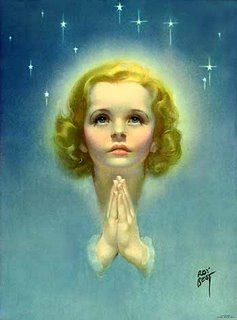 "I think I thought I saw you try"
"I think I thought I saw you try"During the time I was playing church hooky, I was also having terrible fights with my parents, my mother in particular, about the fact that I didn't want to attend church anymore. Ultimately, within a year, I did stop attending, but it was a very difficult period in my life. My parents had active, multiple roles in the church, and it was not easy on them having this rebellious daughter who wasn't showing up in a very social setting around people who had known me since I was a baby. Despite the fights, the rebellion, the sneaking out, I still attended Sunday school, and I did all of my lessons for my classes. We met united, girls and boys, at the beginning of the school, and at it's closing, but the lessons were broken down into boys with male teachers and girls with female teachers. I liked the old-fashioned woman who taught us, and our lessons consisted of being given Bible passages to study, then writing short answers or essays in terms of what we made of them. Looking back, it strikes me as odd that I didn't just slack off in doing this, but I fulfilled the lessons each week, and I enjoyed the discussion in the classes.
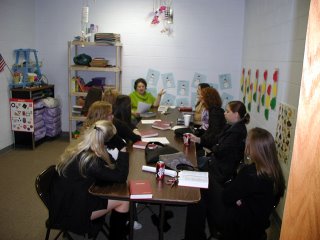
We had a sister church, so I got to know teens in that church quite well. One Sunday in late spring my friend Jeannie, visiting from her church, was attending our Sunday school, and the Superintendent made a surprise announcement. There were going to be awards made to the boy and girl who had done the best job in studying the Bible during the past year. The boy's name was called, and it was someone you would have totally expected. A quiet boy. A studious boy. A deeply religious boy. (3) Then they called the winning girl's name. It was me. In a very quiet chapel, my friend Jeannie yelled out incredulously, "YOU have GOT to be kidding!" There was some tittering following that, as I got up to accept my award, which was a mustard seed bracelet (4).
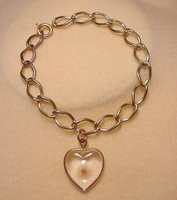
When I returned to my seat, Jeannie was explaining away her shock. No need, really. I understood completely. I was the first girl to wear stockings and heels in our age group. I was the girl who climbed out onto the roof from Jeannie's bedroom window where, hidden by a tree, we would look through the leaves and the sky and talk about boys and our future. Her "kidding" comment meant only that it should have been Marguerite or Mary Ellen, the girls heading straight for the nunnery. Certainly not me.

A book of Shakespeare's sonnets made it's way into my possession when my mother's best friend pulled it from her bookcase, sat down and wrote a sweet inscription, because she knew that I loved Shakespeare. I've since purchased a more noble copy of his poems, but this one remains, solely because of the giver and its message.
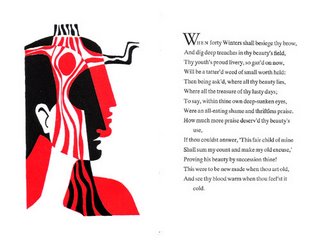 "No amount of political freedom will satisfy the hungry masses" ~ Lenin
"No amount of political freedom will satisfy the hungry masses" ~ Lenin
It's nothing more than a cheap imprint, with garish illustrations, but I can't imagine disposing of it. I always thought the drawings were vaguely "Russian Revolution," and the antithesis of Elizabethan, because of the blaring red, white and black graphic minimalist style. (5).
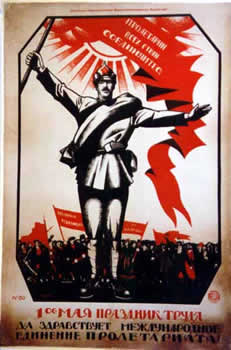 "When sometimes lofty towers I see down-razedAnd brass eternal slave to mortal rage;"
"When sometimes lofty towers I see down-razedAnd brass eternal slave to mortal rage;"When I graduated high school, another one of my mother's friends, an older woman, gave me a book that had been in her possession for some time. I wish I knew how she came to own it, but I don't.
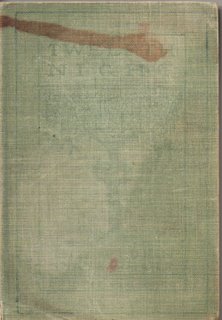
It's a copy of
Twelfth Night, and it belonged to Mary Packard who went to Warren High School (6) in 1913, the year that the book was published. The only real value this book would have now is it's age. In another six years, it will be 100 years old.
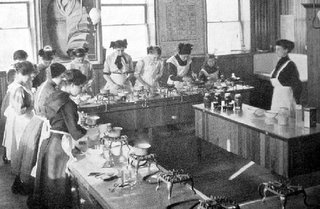 Domestic Science Class, 1913
Domestic Science Class, 1913The true fascination in this volume, for me, is that Mary has written on almost every page: popular sayings of her day, gossip with her girfriends, and silly poems. Mary's friend Kate also wrote in this book, and on one page it says, "Are you going to the recital tomorrow night?" "Yes I am. Kenny asked me this morn." There is also, "Ain't got nothin', Never had nothin', Don't want nothin', 'Cept you!," and "You're my style, kid. You've got such a talkin' way wit you." Throughout the book, again and again, appears "Just a loving glance. Give our love a chance," which obviously was some popular lyric or saying of the time.

She also has written out a lot of phrases with the word "devil," in them like, "Oh! You little devil," or "Cutest little devil," "Would you like to be the devil's wife?," or "Dancing at the devil's ball." Mary wrote a little poem toward the back of the book which reads, "That's the cutest little devil you've ever saw, and she has the biggest little crow, which she stuffs with coconut balls, until she almost falls," signed "The Devil." (7) Those Iowans certainly had a fascination with this. It half makes you wonder if they were out there in the corn fields studying crop circles.
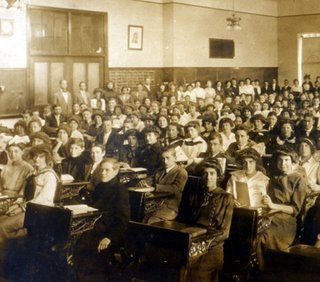 High School, 1913
High School, 1913
Mary's friend Kate wrote out a poem which is now black ink faded to brown which reads, "The whale swallowed Jonah, Jonah began to scratch, The whale threw Jonah in a sweet potato patch. "Eat 'taters, Jonah." The word "kid" shows up a lot, as well. "Cutest kid," "Row your own boat kid," "Roll away, kid and spit it out," and to sum it up with these two crazy kids, they've written "If you want to see some dancing, go to the Devil's Ball. But mind you don't get a fall."--"The Kid."
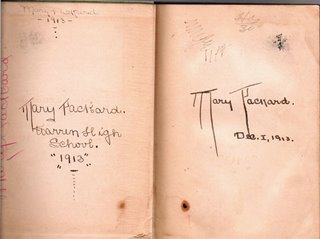
Mary is gone. The woman who gave me the book is gone. I wish some day when I am gone that somehow this book would again make it's way into the hands of a high school girl. An improbability, I know, but a thought. On the very last page, Mary Packard has written a list of thirteen commandments. She also misspelled the word and had to add in an extra "m."
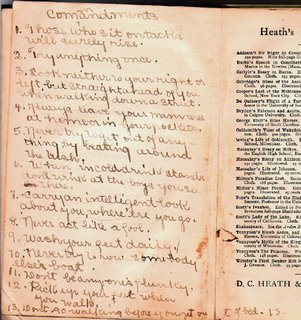 The Thirteen Commandments
The Thirteen Commandments
1) Those who sit on tacks will surely rise.
2) Try anything once.
3) Look neither to your right or left, but straight ahead of you when you are walking down the street.
4) Always leave your manners at home in your pockets.
5) Never try to get out of anything by beating around the bush.
6) When in cold drink stands, don't wink at the boys you see there.
7) Carry an intelligent look about you, where 'ere you go.
8) Never act like a fool.
9) Wash your feet daily.
10) Never try to row somebody's else's boat.
11) Don't be anyone's flunky.
12) Pick up your feet when you walk.
13) Don't go walking before you get out of bed.

The last book I pulled down from the bookcase was a book I bought in an antiquarian shop when I was about 18 or 19 years old. It was a hot summer day and early in the morning, and it was everything a used bookstore should be: musty, books dripping off shelves, a cat, and narrow aisles with dim lighting. The book was tucked into a shelf full of "lesser worth" items, and the first thing to catch my eye was the beautifully marbled cover.
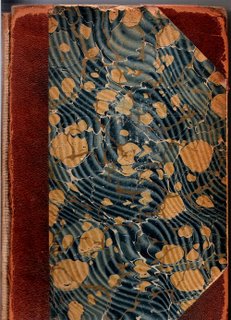
The book was missing it's lining on the spine, but the interior pages were solid, though faded. Called
Shakspere's Works, it includes the plays of
Macbeth, Hamlet and King Lear. The real shocker came when I opened the book. There, on the opposing title page, was a copperplate quality photograph of Edwin Booth as Hamlet. John Wilkes Booth's more famous brother. Equally eerie, the book was published in 1867, two years after Lincoln's assassination.
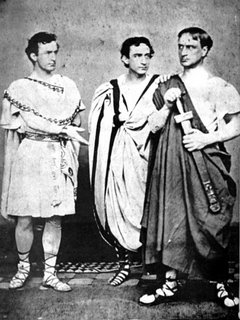
John, Edwin and Junius Booth
The Booths were a family of actors, starting with father, Junius. Junius fled a wife and children in England and came to America with his mistress, and then he proceeded to produce a family with her. Edwin was always considered the most gifted actor of the family, far more well known than brother John, and it's a testament to his popularity, that audiences continued to see him in plays, following his brother's actions. You can see how the copy of his photograph has faded onto the rice paper covering it to protect it, so you get the ghostly repeat image of Hamlet, so to speak: another ghost in a play full of ghosts.
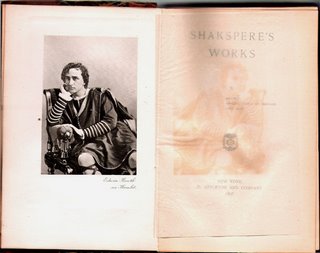 "Alas, poor ghost!" ~~ Hamlet
"Alas, poor ghost!" ~~ HamletIn later years, Edwin formed The Players Club (8) in New York in 1888, and it still stands to this day at 16 Gramercy Park. Inside the club is a famous portrait of Edwin Booth, painted by John Singer Sargent. In 1893, Edwin died at the club, and he is buried in Mount Auburn Cemetery in Cambridge, Massachusetts.
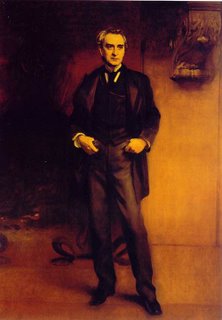 Player or Playaz?
Player or Playaz?I have many other works of Shakespeare, varying in value. I've purchased his books while I was in other countries. I currently have several books about him on my "must read' list including
Hamlet's Purgatory and
Sex and Society in Shakespeare's London. I suppose I'll always be reading Shakespeare, or about Shakespeare, throughout my life. It's been 442 years since Shakespeare was born. I don't know why, but last night I couldn't shake the idea that he would be a rapper if he were alive today. Instead of an Elizabethan Glossary, I'd be going online and hitting the Urban Dictionary. (9).
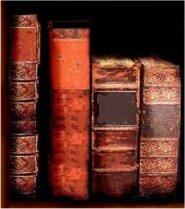
Footnotes:
(1) Don't you just love it? I've footnoted my blog title. It's from Shakespeare's Sonnet LIX:
"Show me your image in some antique book,
Since mind at first in character was done!
That I might see what the old world could say
To this composed wonder of your frame;
Whether we are mended, or whether better they,
Or whether revolution be the same,
O, sure I am, the wits of former days
To subjects worse have given admiring praise."
(2) William Shakespeare was born in April of 1564. There is no specific date of birth because at that time the only date of importance was the date of baptism, though infants often were baptized when they were three days old. Shakespeare's baptismal date was April 26, 1564.
(3) The sad thing is this boy died about two or three years later of leukemia, and the family had more tragedy in the wings. There were four children total: three boys and a girl. The boy who won the prize died first at age 16, his other brother next in line to him in age died in his early twenties, then his sister died a year or two later. The only surviving child is currently running a mission school in New Guinea.
(4) From the King James Version of the Bible: Mark 4: 30-32
"And he said, Whereunto shall we liken the kingdom of God? or with what comparison shall we compare it? It is like a grain of mustard seed, which, when it is sown upon the earth, is less than all seeds that be in the earth: but when it is sown, it groweth up, and becometh greater than all herbs, and shooteth out great branches; so that the fowls of the air may lodge under the shadow of it."
(5) Lenin created the first truly modern propaganda machine, and its most colorful, dramatic and original form was the poster. The colors most frequently used were red, black and white. Although posters were produced in Russia before the Revolution, they were overshadowed by the remarkable propaganda posters of the Soviets.
(6) There is a Warren High School in Lacona, Iowa. This may be the school, because the woman who gave me the book was originally from Iowa. Then again, Mary Packard may have gone to a Warren High School long since pulled down and the lot currently sporting a Wal-Mart.
(7) I checked up on this. Irving Berlin wrote a song on January 8, 1913 called "At the Devil's Ball." The lyrics are:
(First Verse)
I had a dream last night
That filled me full of fright
I dreamt that I was with the Devil below
In his great big fiery hall
Where the Devil was giving a ball
I checked my coat and hat
And started gazing at
The merry crowd that came to witness the show
And I must confess to you
There were many there I knew
(Chorus)
At the Devil's Ball
At the Devil's Ball
I saw the cute Missus Devil, so pretty and fat
Dress'd in a beautiful fireman's hat
Ephraham the Leader Man, who led the band last fall
He play'd the music at the Devil's Ball
In the Devil's hall
(Second Verse)
The Devil's Pa and Ma
Were standing at the bar
Conversing with the little fellow who first
Put the pain in champagne wine
He was pouring it out in a stein
I bought a round of ice
For ev'rybody twice
It wasn't long before I ordered a fan
And before the break of dawn
I put my overcoat in pawn
(8) No relation to
http://playazball.com/(9)
http://www.urbandictionary.com
 Speaking of death sentences, I also watched American Idol last night, something I never watch, and I found it repulsively fascinating to see these kids from God-knows-where, and they are all tv ready, which is to say, they may have been attending Polk County Community College a week ago, but by God now it's $400 haircuts and an eye that can follow the active camera wherever and whenever it is in their vicinity. It seems like we've become a nation ready for our moment. One day you are sitting in your cubicle, working on spreadsheets, and the next day you are having your day in the sun. With everyone engaged in such active preparation for when that day does come, it begs the question, "Who's repairing the washing machines?" I was talking to a friend about this today, and he shot back, "Guest Workers."
Speaking of death sentences, I also watched American Idol last night, something I never watch, and I found it repulsively fascinating to see these kids from God-knows-where, and they are all tv ready, which is to say, they may have been attending Polk County Community College a week ago, but by God now it's $400 haircuts and an eye that can follow the active camera wherever and whenever it is in their vicinity. It seems like we've become a nation ready for our moment. One day you are sitting in your cubicle, working on spreadsheets, and the next day you are having your day in the sun. With everyone engaged in such active preparation for when that day does come, it begs the question, "Who's repairing the washing machines?" I was talking to a friend about this today, and he shot back, "Guest Workers." Speaking of death sentences, I also watched American Idol last night, something I never watch, and I found it repulsively fascinating to see these kids from God-knows-where, and they are all tv ready, which is to say, they may have been attending Polk County Community College a week ago, but by God now it's $400 haircuts and an eye that can follow the active camera wherever and whenever it is in their vicinity. It seems like we've become a nation ready for our moment. One day you are sitting in your cubicle, working on spreadsheets, and the next day you are having your day in the sun. With everyone engaged in such active preparation for when that day does come, it begs the question, "Who's repairing the washing machines?" I was talking to a friend about this today, and he shot back, "Guest Workers."
Speaking of death sentences, I also watched American Idol last night, something I never watch, and I found it repulsively fascinating to see these kids from God-knows-where, and they are all tv ready, which is to say, they may have been attending Polk County Community College a week ago, but by God now it's $400 haircuts and an eye that can follow the active camera wherever and whenever it is in their vicinity. It seems like we've become a nation ready for our moment. One day you are sitting in your cubicle, working on spreadsheets, and the next day you are having your day in the sun. With everyone engaged in such active preparation for when that day does come, it begs the question, "Who's repairing the washing machines?" I was talking to a friend about this today, and he shot back, "Guest Workers."